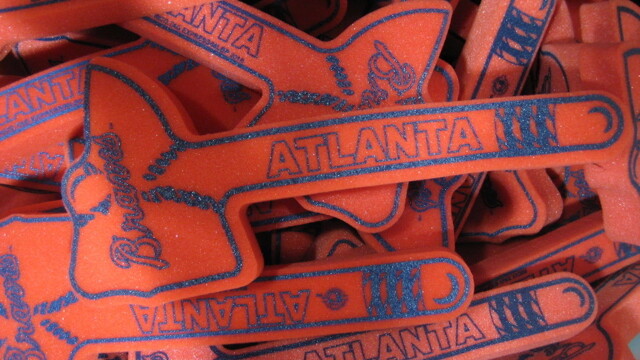Reflecting on a Rival
why do I still hate the Atlanta Braves after all these years?

Twenty years ago in October, 1991, I was following the best World Series ever played: the match-up between my beloved Minnesota Twins and their fellow worst-to-first team from that season, the Atlanta Braves. When the Series began, the Braves were simply the Twins’ rival for the title. By the end, the vanquished Braves were the enemy.
I have developed a respect for the rivals of my favorite teams, understanding that it makes games more enjoyable, and have come to realize that sports are, well, just sports, and not worthy of negative obsession.
How did the Braves, a team I had been familiar with for several years by that point in my youth, suddenly become so despised to me? A lot of little things: Braves fans booing Kent Hrbek of the Twins (after his, er, awkward tag-out of the Braves’ Ron Gant earlier in the Series), the defacing of a Twins billboard near the team hotel in Georgia, the Braves’ David Justice seeming to infer after the Twins’ victory that the Braves should have won.
In my 13-year-old mind, this left the Braves with an indelible black mark. No matter that they were a team that played fundamentally sound baseball, built without big money, consistently great for a decade after that Series, really only leaving a questionable nickname and fan chant (the Tomahawk Chop) to be desired. I hated the Braves, and would do so through the 2000s. Why would I spend my Octobers rooting as hard against a team as I would for my Twins?
Sports “hatred” is not really hatred in the truest sense of the word. Hatred is defined as “prejudiced hostility or animosity.” With the exception of some of the hottest rivalries in the world and a few disturbed individuals, we have no trouble interacting with fans and players of another team. Think of the workplace: one cannot imagine a person who hates another race working with a member of that race, while Packers fans have no problem working and socializing with Vikings fans.
Why, then, do we so intensely dislike a group of people who play a game? Sports teams and players have become substitutes for real-life rivals. We no longer live in small villages or clans fighting those who would do us actual harm. Yet, we need to have something to support and, in turn, something to fight, and sports has now occupied that desire in domestic life in the last century-plus. We develop a loyalty to a team and search for a reason to dislike another team, and take the actions of the opposing team as personal slights against “our guys.”
With maturity, I have developed a respect for the rivals of my favorite teams, understanding that rivalry makes the games more enjoyable, and have come to realize that sports are, well, just sports, and not worthy of negative obsession. I gradually began to get over boorish Braves’ fan behavior and realize the excellence of the team’s organization. Years of Yankees playoff failures were a revelation that the highest league payroll does not equate wins. I have developed a healthy admiration for the Green Bay Packers, even if witnessing their Super Bowl success juxtaposed with the Vikings’ recent struggles does leave some bitterness. I could never muster “hate” for North High or Wartburg College.
No, I do not like the Miami Heat due to LeBron James’s method of departure from Cleveland, but there is no hate involved (then again, I’m not from Cleveland). To this day, the only team with which I have a problem are the former Minnesota North Stars, and that’s because they abandoned my favorite sports state. I may not hate them, but they will always be “them” to me.
There are also some residual issues with Atlanta: after all, I had to endure the Falcons’ 1999 defeat of the Vikings in The Game That Shall Never Be Spoken Of. Yet this autumn, Minnesota and Atlanta found themselves in another championship: the WNBA Finals. Years of broader perspective on sports meant that in the Lynx title run, the Dream were, to me, merely the final obstacle. For sure, the happy ending additionally helped with that perspective, as the Lynx achieved the first professional championship in Minnesota since … the Twins’ win over the Braves in ’91.
Sports are easier to take without the hate. And, Atlanta? That’s two of three, so take that!




















